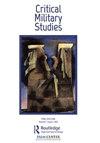作为战争记录的舞蹈:在冲突中追随不守规矩的身体、情感和声音
Q1 Arts and Humanities
引用次数: 1
摘要
摘要面对暴力、战争和悲剧,人们会做什么?那些被暴力感动的人是如何生存、生活、继续前行和感受的?如果“先跳舞,后思考”是自然的顺序呢?在这篇论文中,我建议将舞蹈作为一种日常的、具体的、多感官的战争记录。将战争和军事研究的新轨迹与正在进行的关于战争、化身和情感的女权主义学术以及舞蹈和电子音乐的跨学科研究相结合,本文探讨了政治暴力、军国主义、电子舞曲和文化之间的纠缠。根据我在北爱尔兰和波斯尼亚和黑塞哥维那的研究,我认为,关注这些看不见的纠葛会激活了解战争政治的独特方式:它们揭示了通过DJ表演、舞蹈身体和电子声音调解的武装冲突的替代叙事。这些经历提供了重要的见解,使人们认为理所当然的地点和情感上的战争经济感到不安,同时也再现了冲突逻辑和分歧。我认为舞蹈是一种启发式的手段,可以重新校准我们对战争中感性、情感和具体政治的理解,使我们能够探索抵抗的脆弱可能性,并摆脱它的控制。本文章由计算机程序翻译,如有差异,请以英文原文为准。
Dance as a register of war: following unruly bodies, affects, and sounds in conflict
ABSTRACT What do people do in the face of violence, war, and tragedy? How do those touched by violence survive, live on, keep on going and feeling? What if ‘dance first, think later’ IS the natural order? In this paper, I propose dancing as an everyday, embodied, and multisensorial register of war. Combining new trajectories in war and military studies with ongoing feminist scholarship on war, embodiment, and emotions and interdisciplinary research on dance and electronic music, this paper explores entanglements between sites of political violence, militarism, and electronic dance music and culture. Drawing upon my research in Northern Ireland and Bosnia and Herzegovina, I argue that attending to these unseen entanglements activates distinctive ways of knowing the politics of war: they reveal alternative narratives of armed conflict mediated through and in between DJ performances, dancing bodies, and electronic sounds. These experiences offer important insights that unsettle taken for granted locations and affective economies of war while also reproducing conflict logics and divisions. I propose dance as a heuristic device that can recalibrate our understanding of the sensuous, affective, and embodied politics of/in war, enabling us to explore fragile possibilities for resistance and escape from its grip.
求助全文
通过发布文献求助,成功后即可免费获取论文全文。
去求助
来源期刊

Critical Military Studies
Arts and Humanities-History
CiteScore
1.90
自引率
0.00%
发文量
20
期刊介绍:
Critical Military Studies provides a rigorous, innovative platform for interdisciplinary debate on the operation of military power. It encourages the interrogation and destabilization of often taken-for-granted categories related to the military, militarism and militarization. It especially welcomes original thinking on contradictions and tensions central to the ways in which military institutions and military power work, how such tensions are reproduced within different societies and geopolitical arenas, and within and beyond academic discourse. Contributions on experiences of militarization among groups and individuals, and in hitherto underexplored, perhaps even seemingly ‘non-military’ settings are also encouraged. All submitted manuscripts are subject to initial appraisal by the Editor, and, if found suitable for further consideration, to double-blind peer review by independent, anonymous expert referees. The Journal also includes a non-peer reviewed section, Encounters, showcasing multidisciplinary forms of critique such as film and photography, and engaging with policy debates and activism.
 求助内容:
求助内容: 应助结果提醒方式:
应助结果提醒方式:


